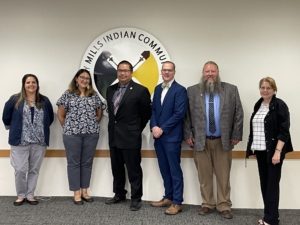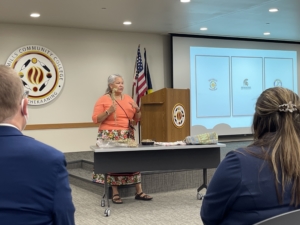Dec 12
Nov 22


Bay Mills Community College (BMCC) premedical students who transfer to Lake Superior State University (LSSU) will have an enhanced opportunity for early admission to the MSU College of Human Medicine under an agreement signed Wednesday.
MSU College of Human Medicine associate director for the Leadership in Rural Medicine Certificate Program, Elizabeth Lyons, EdD, and community assistant dean for the college’s Upper Peninsula Community Campus, Stuart Johnson, DO, were joined by Bay Mills Community College President and CEO Duane A. Bedell as well as Steve Johnson, PhD, Dean of the Lake Superior State University College of Science and the Environment, for the signing ceremony. The event included an opening smudge/prayer in the Anishnaabemowin language to help mark the collaboration by Michele Wellman-Teeple, Anishinaabemowin Pane Immersion Program faculty and director at Bay Mills Community College.
“MSU’s Early Assurance Program is an exciting pathway for BMCC students who want to pursue a career in medicine,” said Duane A. Bedell, Bay Mills Community College President. “We are excited to become partners with Lake Superior State University and Michigan State University. Most importantly, we are excited about the opportunities this pathway provides to our students. Our students have the opportunity to transfer to our neighboring university, Lake Superior State University.”
“Today’s announcement opens new doors for careers in medicine to a wider variety of students in the Upper Peninsula,” added Dr. Stuart Johnson, speaking words from College of Human Medicine Dean, Aron Sousa, MD. “We are committed to a diverse student body, which in turn produces students who can meet the ever-evolving medical needs of Michigan’s underserved populations.”
Leading up to the event, LSSU President Dr. Rodney S. Hanley said, “Lake Superior State University is proud of our newest collaboration with Bay Mills Community College and Michigan State University. This articulation agreement helps underrepresented students pursue premed/medical education and helps fill in gaps in Michigan’s healthcare needs. This is a win-win-win for all three institutions and, more importantly, a win-win for the students who intend to become physicians and for the underserved regions in which they’ll practice. This articulation agreement is another example of the importance we place on innovation-driven, transformative education that engages with community partners, drives social mobility, equips students with the skills necessary to craft a life of meaningful employment, and improves the quality of life of Michiganders.”

Preference for EAP admission will be given to premedical BMCC students who apply to LSSU to complete their bachelor’s degrees. These students must also meet one or more of the following criteria:
BMCC students will receive academic advising directed at admission to MSU College of Human Medicine and will be enrolled in a program of enriching clinical and service experiences in preparation for admission.
While the agreement goes into effect upon the signing of the articulation agreement, academic affairs and admissions teams from the institutions already have been working on setting the program in place by aligning advising and curriculums.
Admission to medical school is highly competitive. This year, MSU College of Human Medicine received 9,213 applicants for 190 seats available for first-year students starting this fall, including 20 students entering medical school through its Early Assurance Opportunity and Early Assurance Program.
“The early assurance partnership has been an incredible opportunity and allowed me to secure a spot in medical school before my fourth year of undergrad,” said Kyle Burton, a LSSU graduate and MSU College of Human Medicine rising third-year student.
Coming to the College of Human Medicine allowed Burton to pursue the Leadership in Rural Medicine certificate program. “I will be able to further my interests of practicing medicine in a rural location to bring effective medical care to patients of underserved populations,” added Burton.